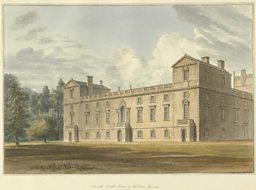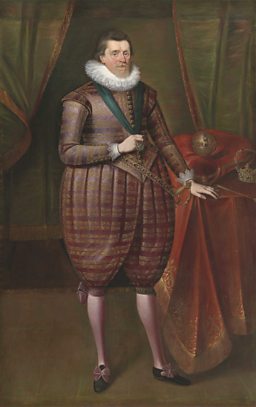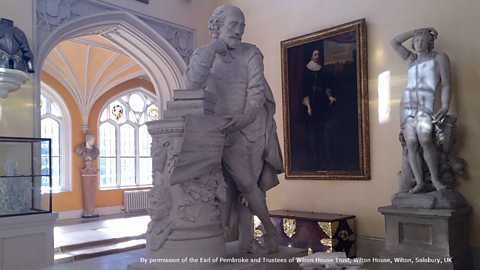Shakespeare's men perform before the King at Wilton in Salisbury
In 1603, the government of the day closed down all the theatres in London as bubonic plague struck the capital once more.
This outbreak was particularly deadly – leading to the deaths of around a quarter of the population of London. It prompted Shakespeare’s troupe of actors, the King’s Men, to leave the capital.
-
![]()
Much ado near me
Hear more Shakespeare stories on BBC Wiltshire
-
![]()
Shakespeare Festival 2016
The BBC celebrates the genius of the bard

In December that year they played to a select audience in Salisbury, one which included the King himself. There’s a good chance Shakespeare himself performed that night - and we may even know what they performed too!
On December 2, 1603, they played to an audience at Wilton House which included the new King James, at the home of the 3rd Earl of Pembroke, William Herbert.
His company performed to no less than six provincial towns that year. In some venues along the way, such as Ipswich, they were paid a modest 26 shillings and 8 pence. Modest that is, compared to Wilton near Salisbury, where they were paid a very handsome £30.
On December 2, 1603, they played to an audience at Wilton House which included the new King James, at the home of the 3rd Earl of Pembroke, William Herbert, and were paid for their “pains and expenses”.
In light of the fact this was a royal performance, could it be that Shakespeare himself took the stage that night at Wilton House? We know he was still acting around this time because he appears on the billing for Ben Jonson’s play Sejanus.
Dr Siobhan Keenan, Reader in Shakespeare and Renaissance Literature at De Montfort University, Leicester, says: “Given the prestige of the occasion and the fact that the performance was, implicitly, by royal command, there’s a good chance that Shakespeare was part of the company that made the journey west to Herbert’s grand Wiltshire residence, which survives today, though little remains of the Tudor mansion in which the royal players performed.
“The 1603 visit was probably not the only one that Shakespeare and his fellow actors made to Wilton House or the only time that the Herberts played host to visiting players. The family’s household accounts from this era have been lost, but we know that acting companies were frequent visitors to the neighbouring town of Marlborough during Shakespeare’s lifetime. Given the town’s small size, it is likely that part of the attraction of visiting it was the opportunity it afforded to visit Wilton House, too, especially given the 3rd Earl’s reputation as a drama-lover and champion of players, including Shakespeare and his fellow King’s Men.”

William Herbert - the fair youth?
William Herbert, the 3rd Earl of Pembroke and his family loved drama, and were the subjects of dedications in plays too.
Herbert is famously cited as a candidate to be the mysterious ‘Mr.W.H’ – the ‘fair youth’ to which many of Shakespeare’s sonnets were dedicated.
Herbert is famously cited as a candidate to be the mysterious ‘Mr.W.H’ – the ‘fair youth’ to which many of Shakespeare’s sonnets were dedicated. There is no doubt he was popular with Shakespeare. The First Folio, published after the playwright's death, was dedicated to him.
And there is evidence this was reciprocated. Dr Siobhan Keenan, writes: “In his capacity as Lord Chamberlain, the 3rd Earl later intervened, for example, to protect the plays of Shakespeare’s company from piracy, ordering the stationers’ company not to print any of their plays without their consent in 1619; and he and his brother, Philip Herbert, 4th Earl of Pembroke, were to be the joint dedicatees of the Shakespeare First Folio when it was published in 1623, and were therein thanked for their ‘many favours’ to Shakespeare and his company.
Evidence of more personal connections with Shakespeare’s company survives, too, as when Herbert wrote of his reluctance to attend a court performance in 1619 because he still mourned for the troupe’s leading player, Richard Burbage, who had died earlier that year."
Shakespeare on Tour
From the moment they were written through to the present day, Shakespeare’s plays have continued to enthral and inspire audiences. They’ve been performed in venues big and small – including inns, private houses and emerging provincial theatres.

BBC English Regions is building a digital picture which tracks some of the many iconic moments across the country as we follow the ‘explosion’ in the performance of The Bard’s plays, from his own lifetime to recent times.
Drawing on fascinating new research from Records of Early English Drama (REED), plus the British Library's extensive collection of playbills, as well as expertise from De Montfort University and the Arts and Humanities Research Council, Shakespeare on Tour is a unique timeline of iconic moments of those performances, starting with his own troupe of actors, to highlights from more recent times. Listen out for stories on Shakespeare’s legacy on your BBC Local Radio station from Monday 21 March, 2016.
You never know - you might find evidence of Shakespeare’s footsteps close to home…
Craig Henderson, BBC English Regions
'As You Like It' in Wilton
Although there is no mention of which play the King’s Men performed at Wilton House in 1603, historians have suggested it could have been As You Like it.

Dr Siobhan Keenan says: “The court record of the King’s Men’s performance at Wilton House does not name the play performed before the king but, if subsequent anecdote is to be believed, it could have been Shakespeare’s As You Like It.
In 1865, historian William Johnston Cory recorded in his diary that Lady Herbert had told him of a ‘letter, never printed from Lady Pembroke to her son, telling him to bring King James from Salisbury to see As You Like It’.
There is no way of confirming the truth of the anecdote or that it relates to the 1603 visit, as the letter mentioned by Cory has never been found; but it is not impossible that the play performed for the royal visit was Shakespeare’s comedy.
As You Like It is thought to have been written between 1598 and 1600 and would, therefore, have been in the company’s repertory in 1603, while its juxtaposition of bawdy wit and more serious reflections on what makes for a good ruler might have been expected to appeal to a king who was known for his equal taste for earthy humour and philosophical reflection, especially upon kingship and rule. For the players this may also have been a chance to showcase their talents to their new monarch and their new patron, demonstrating their capacity to entertain him as he liked.
Shall I compare thee to a summer’s day?
Sonnet 18
Shall I compare thee to a summer’s day?
Thou art more lovely and more temperate.
Rough winds do shake the darling buds of May,
And summer’s lease hath all too short a date.
Related Links
-
![]()
Shakespeare Lives
The nation’s greatest performing arts institutions mark 400 years since the Bard's death

Shakespeare at Wilton House
Roo Green talks to guide Carol Kitching about Shakespeare and the King's Men.
Shakespeare on Tour: Around Wiltshire
-
![]()
'Calamity' overtakes the Scottish Play
Shakespeare delayed in Salisbury
-
![]()
Shakespeare Shadows in Salisbury
Pre-Victorian Wiltshire enjoys 'tableaux vivant'
-
![]()
Marlborough pays a bargain basement price for Shakespeare’s Acting Company
The prosperous market town was a popular venue for Shakespeare’s company of actors
Shakespeare on Tour: Around the country
-
![]()
The 18th century impersonator who was 'the Jon Culshaw of his day'
The city gets its prestigious Theatre Royal
-
![]()
The Northampton Repertory Theatre
Pieces of history in Northampton
-
![]()
Drunken robbers threaten the leader of Shakespeare's players
As he collects admission money at the door!
-
![]()
Shakespeare's tragic heroes appear in Launceston
Size not everything as Shakespeare's tragic heroes appear in remote town of Launceston










